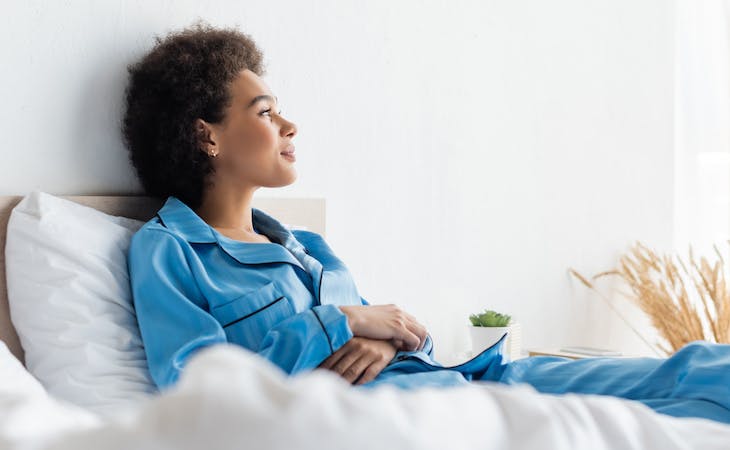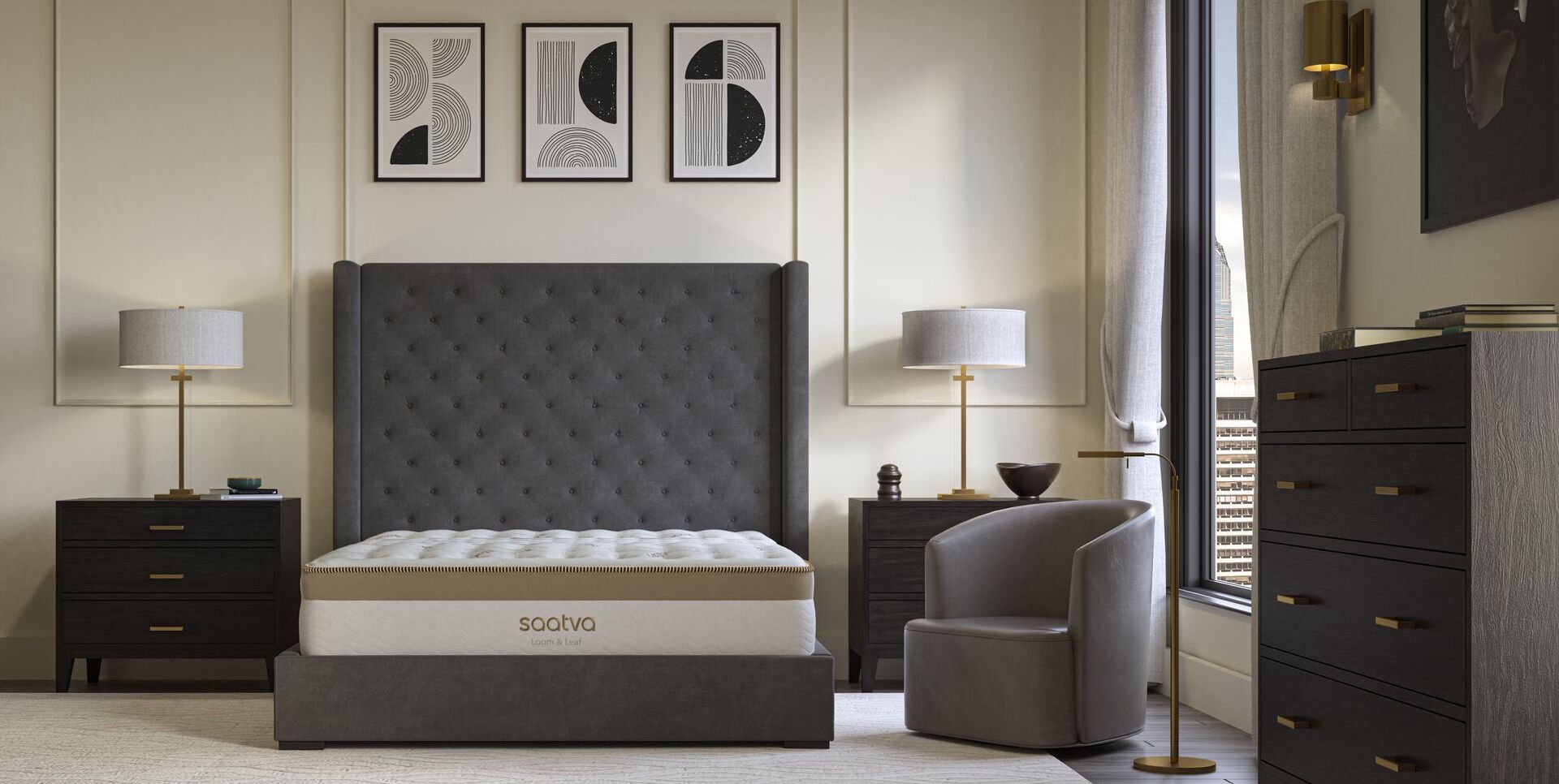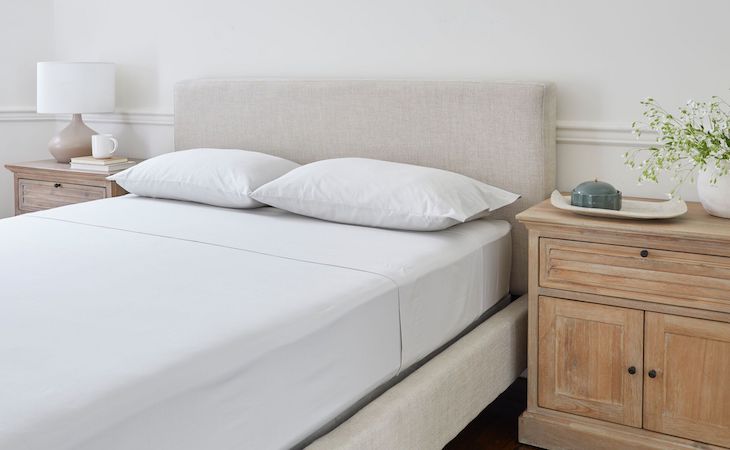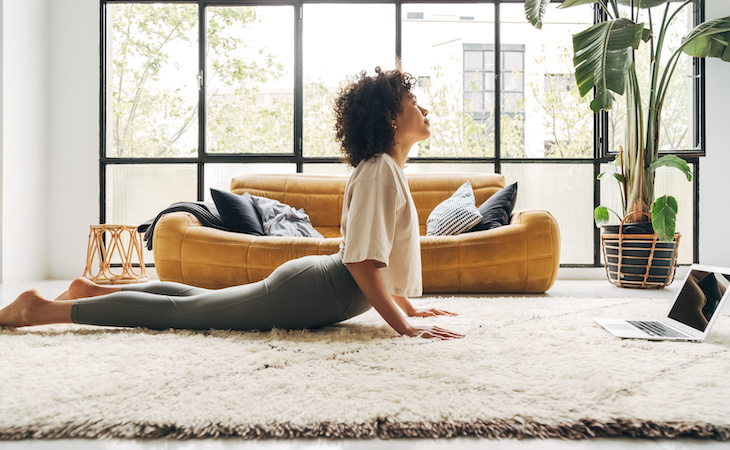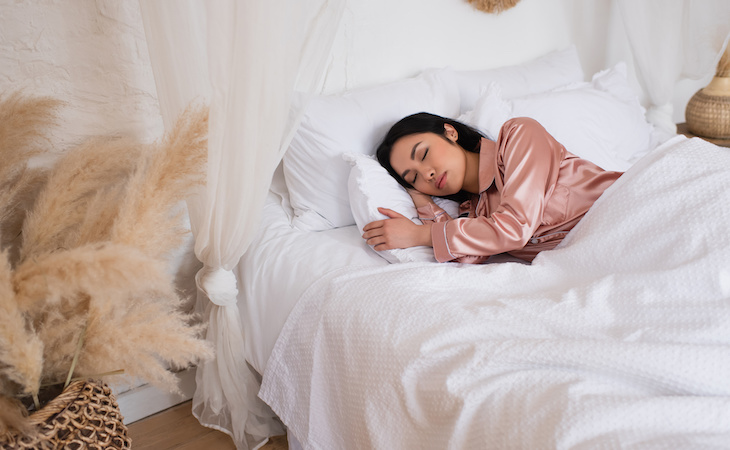As you know, a good night’s sleep enhances just about every aspect of life. Research shows getting seven to eight hours of sleep per night does everything from boost your mood to strengthen your immune system to increase your athletic performance.
According to a new study, it turns out when you go to sleep can also have an impact on your health—particularly when it comes to your heart. Keep reading to learn what experts say is the ideal bedtime for a healthy heart, plus find tips for falling asleep at the right time.
What’s the best time to sleep?
Per a new study published in The European Health Journal, when you go to sleep may play a critical role in heart health. According to the researchers, the best time to sleep for optimal heart health is between 10 p.m. and 10:59 p.m. In fact, this sleep onset time was associated with the lowest incidence of cardiovascular disease (CVD).
The researchers found that people who went to sleep between 11 p.m. and 11:59 p.m. had a 12% greater risk of developing CVD. Those who fell asleep at midnight or later, meanwhile, had a 25% increased risk, and people who fell asleep before 10 p.m. had a 24% higher risk.
Here’s how the study worked: The researchers assessed the sleep patterns and heart health of 88,026 UK-based participants over six years. The participants shared information about their demographics, lifestyles, and physical health. For a seven-day period, they wore accelerometers, devices that track movements.
The researchers collected the sleep onset and wake-up times of the participants from the accelerometers. Then they examined the link between sleep onset timing and cardiovascular disease using a series of scientific models.
Close to the six-year mark of the study, 3,172 of the participants experienced some sort of cardiovascular event, such as a stroke, heart attack, or heart failure. These happened most frequently in people who went to sleep at or after midnight and least frequently in people who hit the hay between 10 p.m. and 10:59 p.m.
When analyzing the data, the researchers took a variety of other factors into account, including age, gender, weight, sleep irregularity, smoking status, socioeconomic status, blood pressure, and cholesterol. In general, they found that consistently going to sleep at or after midnight upped the risk of CDV.
Why is this important? As the researchers point out, heart disease is the biggest cause of mortality worldwide. In the US specifically, more than 126 million adults had a form of CDV between 2015 and 2018.
How do you fall asleep at the optimal time?
Now that you’ve discovered the best time to sleep, here are a few tips to help you fall asleep at the right time. Bonus: These tips aren’t just good for your sleep—they’re also good for your heart.
Exercise regularly
Research confirms exercise can significantly improve sleep quality and lessen the time it takes to fall asleep once your head hits the pillow. It’s also an excellent activity for your heart and overall health.
“Cardiovascular exercises, whether it’s walking or running, anything you can do to get your heart rate up for an extended period of time, it’s really beneficial,” says Chelsie Rohrscheib, PhD, head sleep specialist at Wesper, a sleep analysis and diagnostic company.
Even 30 minutes of low-intensity exercise can improve sleep and lower the risk of death by 17%. Don’t have time for a full 30-minute workout? No problem. Research shows exercising in shorter one- to five-minute bursts is just as beneficial.
Rohrscheib cautions against working out later than midday, though, “because it [exercise] raises your endorphins and increases the blood flow to your brain, but it can also cause a small cortisol release, and cortisol is very wake-promoting.”
Power down electronics before bed
Be honest: Do you take your tech to bed with you? If your answer is yes, you’re not alone. A recent poll conducted by consumer advocacy group Common Sense found that 61% of adults are on their phones half an hour before sleeping.
But all that pre-sleep screen time exposes you to blue light, which mimics natural sunlight and tricks your brain into believing natural daylight is present. As a result, your melatonin production is suppressed, which makes it difficult to fall asleep, says Rohrscheib.
The best way to stop blue light-related sleep issues is to avoid all screens one to two hours before bedtime. Of course, in this tech-obsessed world, that’s easier said than done.
Besides powering down a couple of hours before bed, there are a few other things you can do to prevent blue light from wrecking your shuteye. Rohrscheib suggests using blue-light-blocking glasses to lower the amount of blue light entering your eyes. As fluorescent light bulbs also inhibit melatonin production, it’s also a good idea to use dimmer light during the evening hours.
Practice relaxation techniques
Since the ideal time to sleep is between 10 p.m. and 10:59 p.m., winding down by 8 p.m. gives you the best shot of reaching this goal. So adopt techniques that will bring you into relaxation mode—and avoid overstimulating activities, like playing video games or watching that exciting drama on Netflix. Even reading a thriller may be too much.
Instead, opt for non-stimulating activities, like yoga, deep breathing, meditation, a warm bath, or journaling.
“Meditation has been shown in clinical studies to have amazing benefits for sleep,” says Rohrschab. “Deep breathing exercises are quite nice, especially for the 15 minutes before you shut off your lights because it brings your nervous system into a sympathetic state.”
Be consistent with your routine
Maintaining a consistent bedtime is the best way to familiarize your body with sleeping during that optimal time 10 p.m. hour. “Your circadian rhythm needs to be extremely well regulated for you to get high-quality sleep,” says Rohrscheib.
She adds that a regular bedtime is vital for “getting into those deeper, more restorative stages of sleep.” The good news? In time, your brain will become acclimated to your desired sleep schedule—so do your best to stick with your routine, and your hard work will pay off.
Improve your sleep with Saatva
Your bedroom setup can also go a long way toward helping you fall asleep at the optimal time. Saatva has everything you need to create the most comfortable bedroom possible. Check out our selection of handcrafted mattresses and ultra-soft bedding to transform your bedroom into a sleep oasis.





